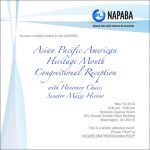For Immediate Release December 10, 2019
WASHINGTON – Today, Patrick J. Bumatay was confirmed to the U.S. Court of Appeals for the Ninth Circuit.
“NAPABA congratulates Patrick Bumatay on his historic confirmation to serve on the U.S. Courts of Appeals for the Ninth Circuits,” said NAPABA President Bonnie Lee Wolf. “Judge Bumatay is the first Filipino American to serve as a federal appellate judge and the first openly gay judge on the Ninth Circuit. We are proud to have supported Judge Bumatay’s nomination.”
Patrick J. Bumatay is an Assistant United States Attorney in the U.S. Attorney’s Office for the Southern District of California. He currently serves in the Office’s Appellate Section, representing the United States before the Ninth Circuit Court of Appeals. Bumatay has held numerous positions in public service throughout the Department of Justice, including the top three leadership offices. He clerked for Judge Timothy M. Tymkovich of the U.S. Court of Appeals for the Tenth Circuit and Judge Sandra L. Townes of the U.S. District Court for the Eastern District of New York. He is a graduate of Yale University and Harvard Law School. He is an active member of NAPABA, our affiliated bar—the National Filipino American Lawyers Association, and the Tom Homann LGBT Law Association.
NAPABA thanks President Trump for nominating Patrick Bumatay to the bench.
###
The National Asian Pacific American Bar Association (NAPABA) is the national association of Asian Pacific American (APA) attorneys, judges, law professors, and law students. NAPABA represents the interests of over 50,000 attorneys and over 80 national, state, and local bar associations. Its members include solo practitioners, large firm lawyers, corporate counsel, legal services and non-profit attorneys, and lawyers serving at all levels of government. NAPABA engages in legislative and policy advocacy, promotes APA political leadership and political appointments, and builds coalitions within the legal profession and the community at large. NAPABA also serves as a resource for government agencies, members of Congress, and public service organizations about APAs in the legal profession, civil rights, and diversity in the courts.
NAPABA | 1612 K St. NW, Suite 510 | Washington, DC 20006 | www.napaba.org




